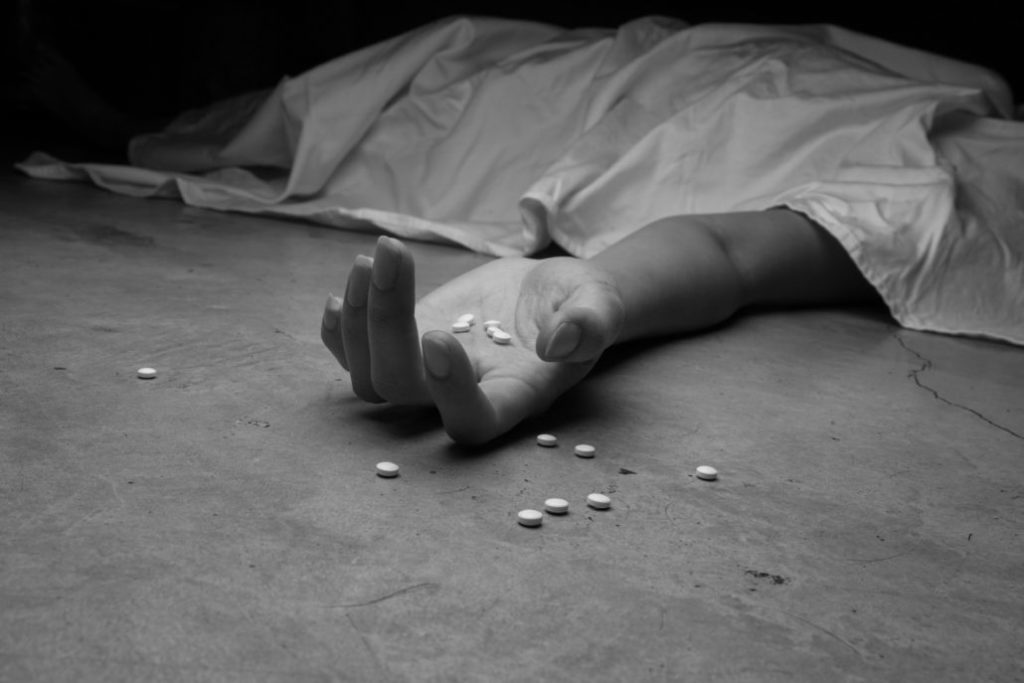Benzo Addiction Defined, Symptoms, Overdose Risks & Substance Abuse Treatment Options
What is Benzo Addiction?
A benzodiazepine, or benzo, is a class of drugs used to treat various conditions. Conditions commonly treated with benzos include insomnia, anxiety, sleep disorders, and even alcohol withdrawal. In addition, these substances act on the GABA receptors in the brain as they produce a very calming effect. Unfortunately, benzo addiction can develop in as little as a month. High-risk patients or those with unstable medical conditions or a significant seizure history may benefit from admission to an inpatient service for benzodiazepine detox or withdrawal. [1]
Gamma-aminobutyric acid or GABA is a naturally occurring amino acid that works as a neurotransmitter in your brain.
Benzodiazepine dependence is different from benzo addiction because addiction occurs only in some people. When you take benzodiazepines for multiple days or weeks, the brain adapts to the presence of the drugs. As a result, you may start to depend on the drugs to function. Benzo dependency is the state of relying on benzo to feel natural.
As drug dependency amplifies, the brain begins to need larger doses to feel similar effects. Requiring more significant amounts of a substance is an adaptation called tolerance. For example, when someone dependent on a benzodiazepine stops taking the drug, they experience benzo withdrawal symptoms. [2]

Types Of Benzodiazepines
There are many different benzodiazepines on the market. Doctors may prescribe one over the other for several reasons. Perhaps their patients have seen more progress for one over the other, or a specific benzo formulation is known to better meet a client’s needs. Furthermore, here is a list of the different types of benzos with their generic and brand names.
- Alprazolam (Xanax, Xanax XR)
- Clobazam (Onfi)
- Clonazepam (Klonopin)
- Clorazepate (Tranxene)
- Chlordiazepoxide (Librium)
- Diazepam (Valium, Diastat Acudial, Diastat)
- Estazolam (Prosom – discontinued brand in the US)
- Lorazepam (Ativan)
- Oxazepam (Serax – discontinued brand in the US)
- Temazepam (Restoril)
- Triazolam (Halcion)
Benzodiazepines alter the activity of the neurons that trigger stress and anxiety reactions. The Food and Drug Administration (FDA) has approved them for the treatment of:
- Insomnia
- Generalized anxiety disorder
- Social anxiety disorder
- Seizure disorders, such as epilepsy
- Panic disorder
The type of benzodiazepine will determine the potential uses. Doctors may also prescribe these drugs off-label for various other conditions and issues, including:
- Other sleep disorders
- Tic disorders
- Bipolar disorder
- To manage alcohol withdrawal
They may also use them in preparation for some medical procedures.
What Causes Benzo Addiction?
Like other drug addiction effects, benzodiazepines cause a dopamine discharge. Dopamine is a chemical contributing to how we feel pleasure. Over time, these drugs alter the way the brain releases dopamine. This affects the way people feel euphoria or happiness from all activities. As a result, people addicted to benzodiazepines can sometimes feel happy unless they take large doses of the drugs.
Addiction also alters the motivation system in the brain. The brain correlates the substances with happiness and causes cravings that drive the person to take the drugs, and withdrawal is another part of benzo addiction. People who attempt to discontinue the drugs on their own are seldom able to make it through withdrawal. Instead, the symptoms are usually so painful that people return to the benzos for relief.
Benzos can also be addictive because they momentarily alleviate specific mental health issues. For example, some people self-medicate with benzos to mitigate anxiety or sleep difficulties. The drugs can temporarily manage these illnesses, but long-term use can make people think they have to have the drugs to feel less troubled.
Benzodiazepine Side Effects
- Drowsiness
- Confusion
- Dizziness
- Trembling
- Impaired Coordination
- Vision Problems
- Grogginess
- Feelings of Depression
- Headache
Benzo Addiction Long Term Side Effects
- Possible Dementia
- Physical Dependence
- Overdose

Benzo Addiction Overdose
The most significant risk of using benzodiazepines and a reason to get into a benzo addiction treatment program is likely overdosing. With a capacity to develop a tolerance, the longer someone takes benzodiazepines, the greater dosage they will need to take to reach the desired effect. Hence, the greater the risk of overdosing. In addition, sedative benzos cause breathing to slow. In turn, less oxygen is directed through the lungs to the brain and the rest of the body. Finally, once you take a larger dose, breathing delays to the point of being fatal.
A benzodiazepine Overdose Can Lead To:
- Extreme sedation or drowsiness
- A very low breathing rate
- Confusion and difficulty thinking
- Slurred speech
- Loss of muscle control
- Coma
It can be fatal if a person:
- Uses the drugs with alcohol or opioids
- Is older and takes too much of the drug
- Is taking other drugs, and the effects build up in their body
Anyone who shows signs of an overdose or an adverse reaction after taking benzodiazepines will need emergency medical help.
Benzo Addiction Withdrawal Symptoms
The benzo withdrawal symptoms will differ depending on how the detox process is administered. For instance, in a professional detox center where the client is weaned off properly, symptoms include feeling sleepy and depressed and sweating and chills.
Benzodiazepine Withdrawal Syndrome
Benzodiazepine withdrawal becomes much more severe and fatal, most especially without medical supervision. [3] In addition, you may develop Benzodiazepine Withdrawal Syndrome that could cause more painful effects to your body and mind.
General
- Headache
- Palpitations
- Sweating
- Tremor
- Muscle pain, stiffness, and aches (limbs, back, neck, jaw)
Neurological
- Dizziness
- Paraesthesia or shooting pains in neck and spine
- Visual disturbances (blurred vision, diplopia, photophobia, image lags behind eye movements)
- Tinnitus
- Faintness and dizziness, sense of instability
- Confusion, disorientation (may be intermittent): A common cause of disorder in older patients
- Delirium (in the absence of autonomic hyperactivity): Particularly in older patients
- Delusions, paranoia
- Hallucinations (visual, auditory)
- Grand mal seizures 1–12 days after discontinuing benzodiazepines
Gastrointestinal
- Nausea
- Anorexia
- Diarrhea (may resemble irritable bowel syndrome)

Psychological
- Rebound insomnia, nightmares
- Anxiety, panic attacks
- Irritability, restlessness, agitation
- Poor memory and concentration
- Perceptual distortions – sensory hypersensitivity (light, sound, touch, taste), abnormal sensations (e.g., ‘cotton wool’ sensations)
- Metallic taste
- Distortions of body image
- Feelings of unreality, depersonalization, derealization
- Depression, dysphoriac
Benzodiazepine Detox Withdrawal Timelines
Much like detoxing from other prescription drugs, benzo withdrawal timelines can differ from case to case. For someone using short-acting benzos, withdrawal symptoms may begin to present themselves in as little as 6 to 8 hours. However, if a longer-acting benzodiazepine was used, it could be 24 to 48 hours before symptoms are observed. Withdrawal symptoms typically last about four days. And rebound symptoms may last about 2-3 days from when they begin.
If a friend or loved one begins expressing any of these behaviors, he or she may need professional help:
- Taking another person’s pills for his or her own use
- “Doctor shopping,” or visiting multiple doctors to obtain multiple prescriptions
- Forging prescriptions
- Stealing or borrowing a friend or loved one’s prescription
- Purchasing benzodiazepines illegally, such as through a street dealer
- Taking more benzodiazepines and/or over a longer period than first intended
- Spending significant time getting, using, and recovery from benzodiazepines
- Experiencing cravings or withdrawal symptoms
- Needing more of the benzo to achieve the same effect
- Exhibiting impaired performance at home, work, or school
Someone suffering from a Benzodiazepine addiction will build a tolerance to the drug, requiring more of it to reach the previous effects. He or she might begin shirking people and activities they used to enjoy in order to get and use Benzos. These are some of the clinically recognized signs of an addiction.
Before starting treatment with benzodiazepines, a person must tell their doctor about every other medication that they are using.
Some drugs may intensify the effects of benzodiazepines, while others may make them less effective.
It is essential not to use benzodiazepines with opioids or alcohol, as this can lead to life-threatening effects.
Benzo Addiction Treatment At We Level Up TX
Benzo addiction can have social and psychological effects on those who struggle with it. Unfortunately, some may find these effects to be the most significant difficulty they encounter.
However, for others, it is the physical effects that are the scariest. When one stops taking benzodiazepines without tapering off, severe symptoms such as tremors, seizures, and even death can occur. For this reason, professional treatment at a medical benzodiazepine detox facility is crucial.
Once the benzo detoxification process has been safely completed, then an individualized treatment plan is developed. Most importantly, during treatment, individuals who have struggled with benzo addiction will learn skills and mechanisms to help them stay off these drugs and lead better lives.

If you or someone you love struggles with substance use to Ativan, valium, or any other form of benzo addiction, get them the help they need and deserve. Contact our team at We Level Up Texas to get started today!
Sources:
[1,3] Management of Benzodiazepine Misuse and Dependence – National Center for Biotechnology Information
[2] Benzo Addiction – We Level Up https://welevelup.com/addiction/benzo-addiction/
Benzo Addiction Addiction – CBT Therapy For Addiction – We Level Up FL Dual-Diagnosis Center